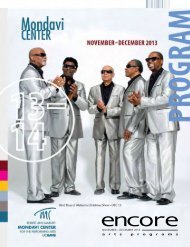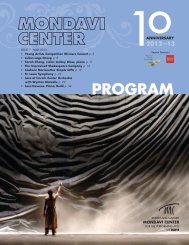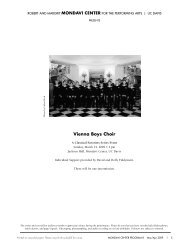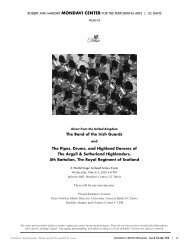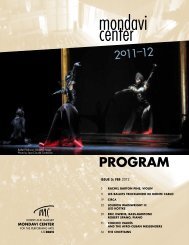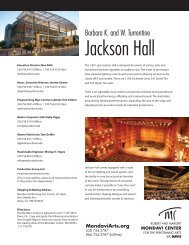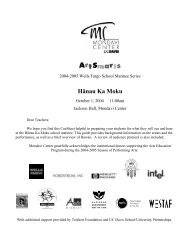You also want an ePaper? Increase the reach of your titles
YUMPU automatically turns print PDFs into web optimized ePapers that Google loves.
King’s first big break came in 1948, when he performed on Sonny<br />
Boy Williamson’s radio program on KWEM out of West Memphis.<br />
This led to steady performance engagements at the Sixteenth Avenue<br />
Grill in West Memphis and later to a 10 minute spot on black<br />
staffed and managed radio station WDIA. King’s Spot, sponsored by<br />
Pepticon, a health tonic, became so popular that it was increased in<br />
length and became the Sepia Swing Club. Soon, King needed a catchy<br />
radio name. What started out as Beale Street Blues Boy was shortened<br />
to Blues Boy King, and eventually B.B. King. Incidentally, King’s<br />
middle initial “B” is just that; it is not an abbreviation.<br />
In the mid-1950s, while King was performing at a dance in Twist,<br />
Arkansas, a few fans became unruly. Two men got into a fight and<br />
knocked over a kerosene stove, setting fire to the hall. King raced<br />
outdoors to safety with everyone else, but then realized that he left<br />
his $30 guitar inside, so he rushed back inside to retrieve it, narrowly<br />
escaping death. When he later found out that the fight had been<br />
over a woman named Lucille, he decided to give the name to his guitar.<br />
Each one of King’s guitars since that time has been called Lucille.<br />
Soon after his number one hit, “Three O’Clock Blues,” King began<br />
touring nationally, and he has never stopped, performing an average<br />
of 125 concerts a year. In 1956, King and his band played an astonishing<br />
342 one-night stands. From the chitlin circuit with its small<br />
town cafes, ghetto theaters, country dance halls and roadside joints<br />
to jazz clubs, rock palaces, symphony concert halls, college concerts,<br />
resort hotels and prestigious concert halls nationally and internationally,<br />
King has become the most renowned blues musician of the past<br />
60 years.<br />
King’s technique is nonetheless complex, featuring delicate filigrees<br />
of single string runs punctuated by loud chords, subtle vibratos,<br />
and “bent” notes. The technique of rock guitar playing is to a large<br />
degree derived from King’s playing.<br />
Over the years, King has developed one of the world’s most readily<br />
identified guitar styles. He borrowed from Lonnie Johnson, Blind<br />
Lemon Jefferson, T-Bone Walker and others integrating his precise<br />
vocal-like string bends and his left hand vibrato, both of which have<br />
become indispensable components of rock guitarist vocabulary. His<br />
economy, his every-note-counts phrasing, has been a model for thousands<br />
of players including Eric Clapton, George Harrison and Jeff<br />
Beck.<br />
King has mixed traditional blues, jazz, swing, mainstream pop and<br />
jump into a unique sound. His singing is richly melodic, both vocally<br />
and in the “singing” that comes from his guitar. In King’s words,<br />
“When I sing, I play in my mind; the minute I stop singing orally, I<br />
start to sing by playing Lucille.<br />
“I’m trying to get people to see that we are our brother’s keeper, I<br />
still work on it. Red, white, black, brown, yellow, rich, poor, we all<br />
have the blues.<br />
“From my own experience, I would say to all people but maybe to<br />
young people especially black, white or whatever color, follow your<br />
own feelings and trust them; find out what you want to do, and do it<br />
and then practice it every day of your life and keep becoming what<br />
you are despite any hardships and obstacles you meet.”<br />
“I’m me,” King told Time magazine in 1969. “Blues is what I do best.<br />
If Frank Sinatra can be the best in his field, Nat King Cole in his,<br />
Bach and Beethoven in theirs, why can’t I be great and known for it,<br />
in blues?”<br />
King has influenced Eric Clapton, Mike Bloomfield, Albert Collins,<br />
Buddy Guy, Freddie King, Jimi Hendrix, Otis Rush, Johnny Winter,<br />
Albert King and many others while being influenced by Charles<br />
Brown, Lowell Fulsom, Elmore James, Blind Lemon Jefferson, Jimmy<br />
Rushing, T-Bone Walker, Bukka White and others.<br />
In 1969, B.B. was chosen by the Rolling Stones to open 18 American<br />
concerts for them; Ike and Tina Turner also played on 18 shows.<br />
King also made the first of his numerous appearances on Johnny<br />
Carson’s The Tonight Show. In 1970, King premiered in Las Vegas at<br />
Caesar’s Palace and at the Royal Box in the American Hotel in New<br />
York City as well as on The Ed Sullivan Show.<br />
In the early 1970s, B.B. toured Ghana, Lagos, Chad and Liberia<br />
under the auspices of the United States State Department, besides<br />
playing the major jazz festivals around the world.<br />
King was inducted into the Blues Foundation Hall of Fame in 1984<br />
and into the Rock and Roll Hall of Fame in 1987, where Sting of the<br />
Police made the induction speech. King was the recipient of the 1986<br />
National Association for Campus Activities Hall of Fame Award.<br />
King was Blues Act of the Year in 1985, 1987 and 1988 Performance<br />
Award Polls. He is a founding member of the John F. Kennedy<br />
Performing Arts <strong>Center</strong>. King received the Grammy “Lifetime<br />
Achievement Award” in 1987. He won the Lifetime Achievement<br />
Award from the Blues Foundation in 1997. King has received four<br />
honorary doctorates: Tougaloo (Mississippi) College (L.H.D.) in<br />
1973; Yale University (D. Music) in 1977; Berklee College of Music<br />
(D. Music) in 1982 and Rhodes College of Memphis (D. Fine Arts)<br />
in 1990. In 1992, he received the National Award of Distinction from<br />
the University of Mississippi.<br />
On May 3, 1991, “B.B. King’s Blues Club” opened in Memphis and<br />
also at the Universal City Walk in Los Angeles in 1994, and although<br />
King resides in Las Vegas, he plans to play at his clubs at least four<br />
times a year. A B.B. King Blues Club opened in New York’s Times<br />
Square’s E-Walk in early 2000.<br />
In 1996, the CD-ROM On The Road With B.B. King: An Interactive<br />
Autobiography was released to rave reviews including an “A-” in<br />
Entertainment Weekly. Also in 1996, King’s autobiography Blues All<br />
Around Me (written with David Ritz) was published and won second<br />
prize in the prestigious Eighth Annual Ralph J. Gleason Music Book<br />
Awards. The biography The Arrival of B.B. King by Charles Sawyer<br />
was published in 1980 by Doubleday.<br />
In 1997, MCA released King’s album Deuces Wild with King in tandem<br />
with 13 legendary artists. The lineup included Eric Clapton,<br />
the Rolling Stones, Bonnie Raitt, Willie Nelson, Joe Cocker, Tracy<br />
Chapman, Mick Hucknall (Simply Red), Dr. John, Marty Stuart,<br />
D’Angelo, David Gilmore & Paul Carrick and Heavy D. Deuces Wild<br />
became King’s second gold album. In 1999, B.B. King released Let<br />
the Good Times Roll, his tribute to Louis Jordan. “Louis Jordan was<br />
a great musician,” says King, “and in my opinion, was way ahead of<br />
his time. As people get to know him, they will realize what a great<br />
contribution he left to the music of today.”<br />
<strong>Mondavi</strong>Arts.org | 21



